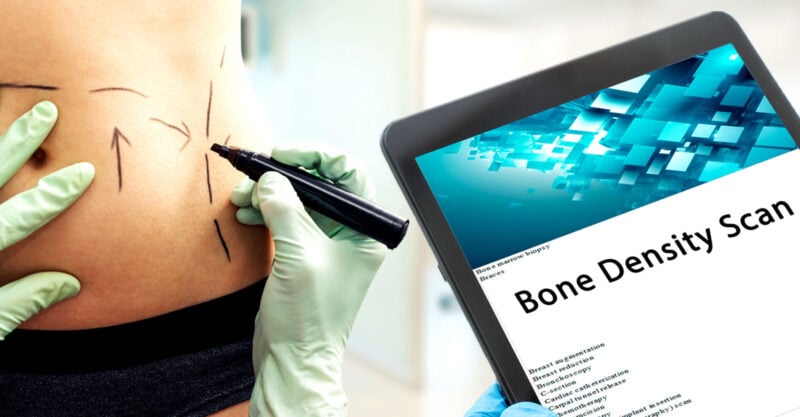Teens Who Get Weight-Loss Surgery Have Weaker Bones — Researchers Suggest ‘Novel Therapies’ as Solution
Researchers behind a new peer-reviewed study showing teens who undergo a sleeve gastrectomy for weight loss experience weakened bones said their findings include how to measure the bone loss, which could lead to novel therapies to treat it — but critic says that’s the wrong solution.
Miss a day, miss a lot. Subscribe to The Defender's Top News of the Day. It's free.
Teens and young adults who undergo weight-loss surgery may end up with weakened bones, according to a new peer-reviewed study.
The two-year study showed that obese young adults ages 13-24 who had a sleeve gastrectomy experienced long-term negative effects on their bones — including reduced vertebral bone strength and density — when compared to obese young adults who did not undergo the surgery.
A sleeve gastrectomy removes roughly “75% to 80% of the stomach to restrict food intake and induce weight loss.”
Reducing gastric volume affects hormone secretion which “in turn can influence bone health,” said the researchers, led by Dr. Miriam A. Bredella, a musculoskeletal radiologist at the Massachusetts General Hospital and professor of radiology at Harvard Medical School.
Bredella said her team’s findings could likely lead to the development of new treatments for addressing bone strength in obese young adults who have undergone a sleeve gastrectomy.
“Our observed effects of weight-loss surgery on bone strength and bone marrow fat might also identify new targets for novel therapies,” Bredella said in a press release.
“As bariatric surgery is increasingly performed in adolescents, its effect on bone health needs to be emphasized, especially to the physicians who will continue to provide routine medical care for these patients,” Bredella added.
Dr. Michelle Perro, integrative pediatrician and executive director of GMO Science, told The Defender that the study demonstrated “yet another reason to call for an immediate cessation of barbaric bariatric surgery in children and address the real root causes of childhood obesity, and abandon Band-Aid solutions.”
“So now, what are they saying?” Perro asked. “‘Oh look, we have a marker, radiologically speaking.’ So any kid who they want to do bariatric surgery on should get a CT scan [to] identity how much bone loss they have.”
Perro added:
“If you don’t address diet and nutrient level, you’ve totally missed the mark when understanding bone density, osteopenia and osteoporosis.
“We also know that young people who have bone loss have a much greater risk of osteopenia and osteoporosis later in life.
“So what you do as a young person in terms of bone density affects your bone health for the rest of your life.”
Perro said she wasn’t surprised by the researchers’ findings, as bariatric surgery is a “known and common complication.”
Bredella and her co-authors — who published their study in Radiology, a journal of the Radiological Society of North America — acknowledged that prior research showed bariatric surgery in adolescents and young adults negatively affects bone health.
The contribution of their study, they said, was that they were able to measure the negative effects using advanced radiology imaging techniques.
Bredella’s team used CT scans of the lumbar spine to assess bone density and strength and an imaging technique — “proton magnetic resonance spectroscopy” — to assess the amount of fat in the bone marrow of the lower lumbar spinal bones.
Because more fat in the bone marrow means weaker bones, measuring the amount of bone marrow fat is a good “imaging biomarker” for “skeletal integrity and metabolic risk,” they said.
Perro criticized the researchers for not looking at children under age 13, as most bone growth slows or stops at the onset of puberty.
Childhood is a “critical time” to create “really good bone density — not the bone loss,” Perro said.
“The study that should have been done is the effect of bariatric surgery on kids whose bones are still growing if they wanted to look at this issue critically,” she said.
Earlier this year, the American Academy of Pediatrics issued new clinical guidelines for treating childhood obesity that endorsed weight-loss pharmaceuticals and — for the first time ever — weight-loss surgeries as “safe and effective” treatments for childhood obesity.
Recently, a JAMA Pediatrics study showed that the rate of bariatric surgery among 10- to 19-year-olds is on the rise and jumped by nearly 20% between 2020 and 2021.
And as of June 15, there were more than 4,000 ad campaigns for weight-loss drugs running on Facebook and Instagram as companies “rush” to “capture new weight-loss customers,” NBC News reported.
According to Perro, “Pharmaceutical-based therapeutics are again missing the mark.”
“We don’t want to give kids more drugs to treat symptom-based problems. This is egregious,” she added.
“We have created a problem now with solutions … when we have not addressed why the child has the problem in the first place,” she said. “This is misguided at every level. I think it’s a travesty.”
Sign up for free news and updates from Children’s Health Defense. CHD focuses on legal strategies to defend the health of our children and obtain justice for those injured. We can't do it without your support

